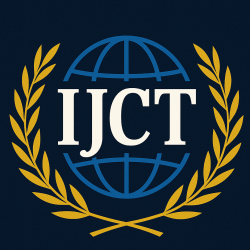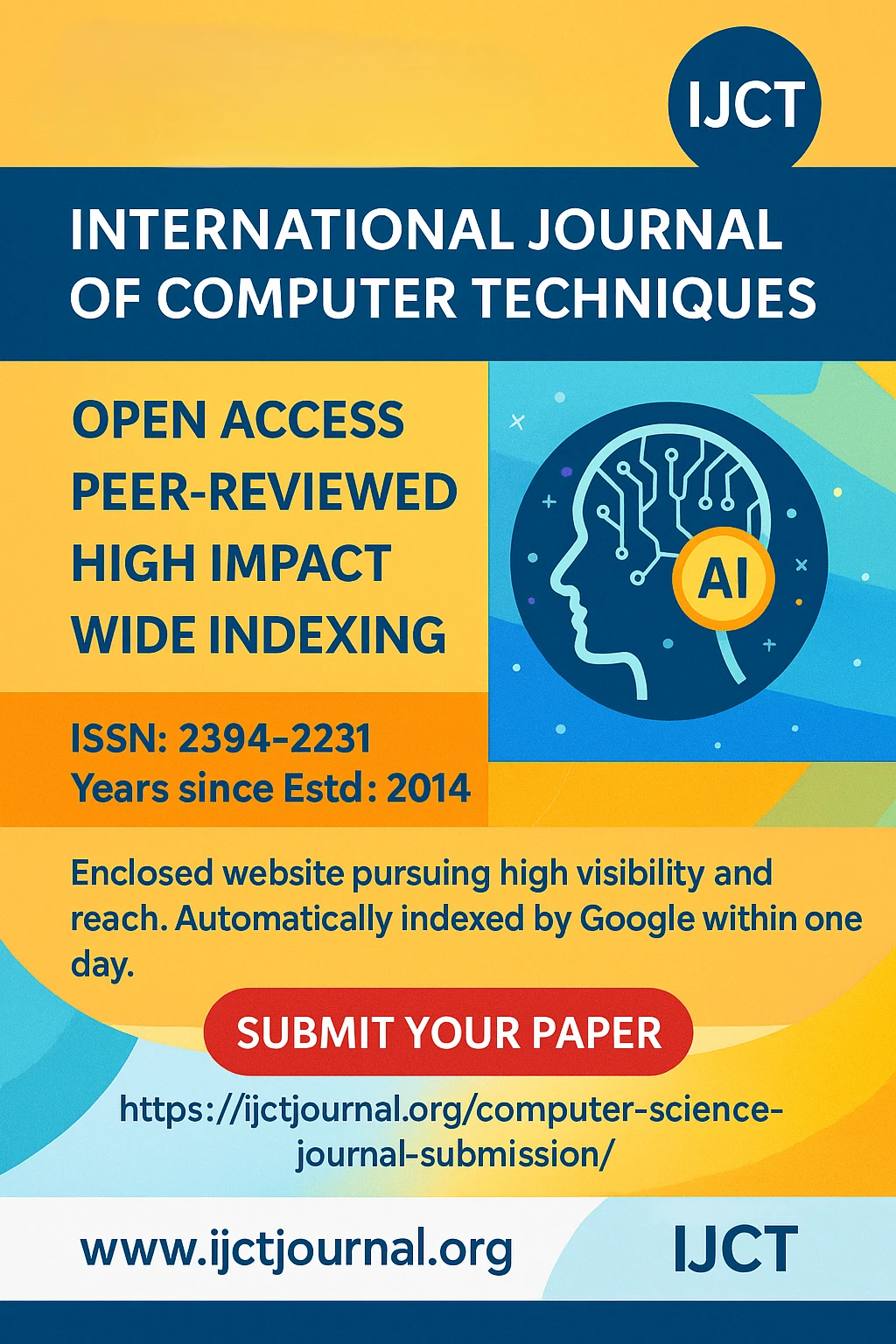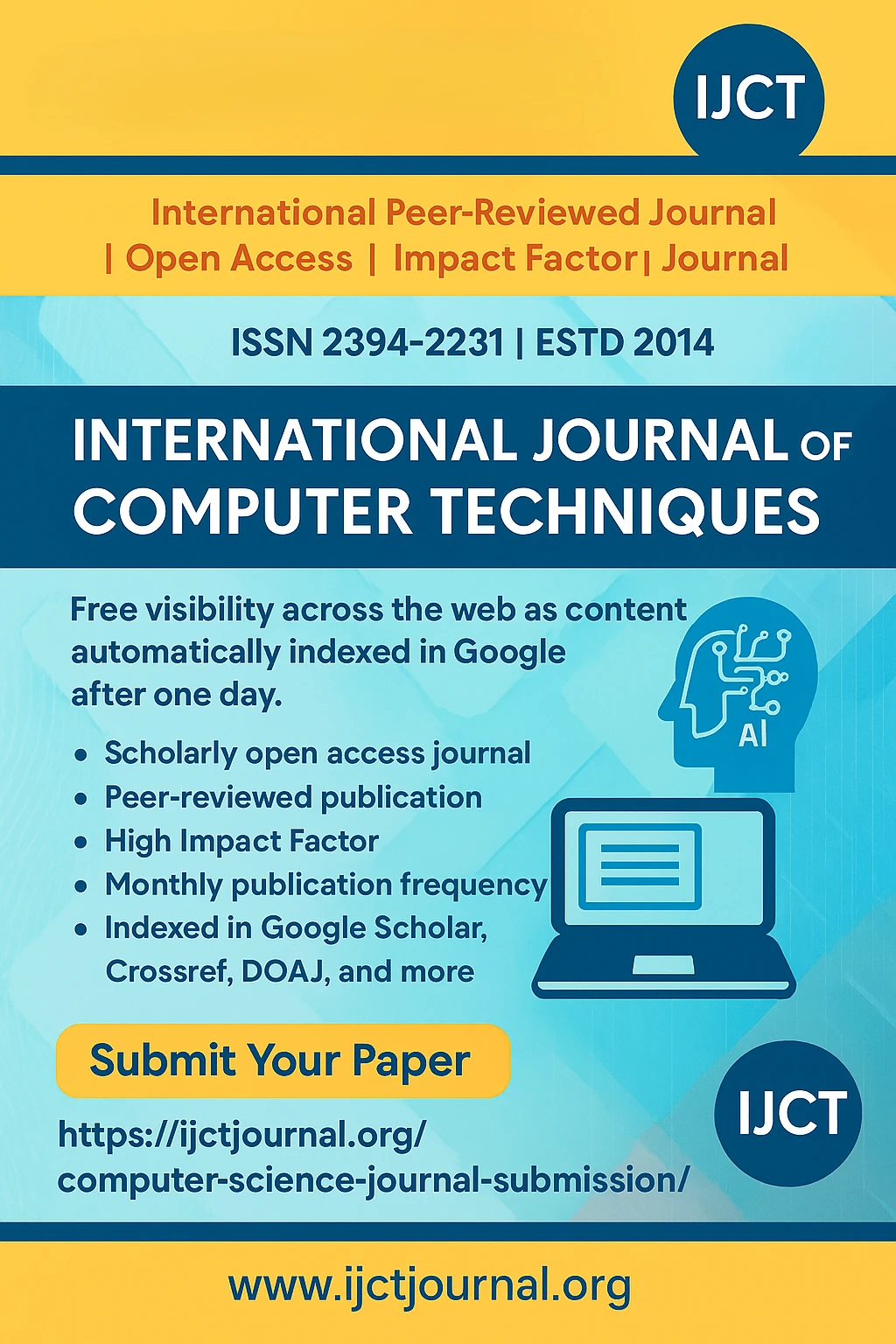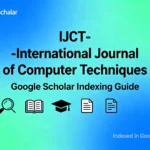
AI-Driven Optimization of Renewable Energy Systems: A Comprehensive Review | IJCT Volume 12 – Issue 5 | IJCT-V12I5P77

International Journal of Computer Techniques
ISSN 2394-2231
Volume 12, Issue 5 | Published: September – October 2025
Author
Kavya Miglani
Table of Contents
ToggleAbstract
The rapid advancement of artificial intelligence (AI) has opened new avenues for optimizing renewable energy systems, enhancing their efficiency by up to 20%, improving forecasting
accuracy by 15-30%, and enabling better integration into existing power grids through real-time decision-making. This comprehensive review explores the application of AI techniques in optimizing various renewable energy sources, including solar, wind, hydro, and bioenergy. By examining recent research and over four detailed case studies, we identify key AI methodologies-such as machine learning, deep learning, and reinforcement learning-their
quantifiable benefits, persistent challenges, and emerging future prospects. This paper aims to provide a holistic understanding of how AI-driven optimization can accelerate the transition
towards a sustainable energy future, potentially reducing greenhouse gas emissions from renewable systems by up to 25% and improving economic returns across installations by 10-15%.
Keywords
Artificial Intelligence, Renewable Energy, Optimization, Solar Energy, Wind Energy, Hydro Energy, Bioenergy, Machine Learning, Deep Learning, Smart GridsConclusion
The integration of artificial intelligence (AI), specifically machine learning (ML) and deep learning (DL), into renewable energy systems has ushered in notable advancements in forecasting, performance optimization, fault detection, and maintenance across solar, wind, and hydro sectors. In solar energy, models such as convolutional neural networks (CNNs) and long short-term memory (LSTM) networks have improved solar irradiance forecasting and enhanced photovoltaic (PV) system efficiency while enabling predictive maintenance for panels and inverters. Similarly, AI approaches like recurrent neural networks (RNNs) and support vector machines (SVMs) have led to more accurate wind speed forecasting, optimized turbine performance, and facilitated early fault detection in wind energy systems. For hydroelectric applications, LSTM and artificial neural network (ANN) models have refined water flow forecasting and turbine optimization, as well as enabled AI-driven fault detection systems for reduced downtime and operational costs.
Together, these sector-specific successes demonstrate the transformative effect of AI on renewable energy production, establishing a foundation for more efficient, reliable, and sustainable energy systems. The continued evolution of AI techniques and expansion of
high-quality data promise even greater capabilities in real-time optimization and resource management, supporting a future where renewable energy is increasingly economical and dependable. This review underscores both the significant progress achieved and the ongoing potential for AI to drive the next wave of innovation in the renewable energy domain
References
[1]A. K. Verma, S. K. Singh, and M. K. Singh, “Artificial intelligence techniques for renewable energy systems: A review,” Renewable Sustain. Energy Rev., vol. 102, pp. 234-247, Mar. 2019.
[2]X. Zhang, J. Li, and Y. Ni, “A review of deep learning applications in wind energy systems,”
Renewable Sustain. Energy Rev., vol. 100, pp. 482-497, Jan. 2019. [3]International Energy Agency, Artificial Intelligence and Machine Learning in Energy Systems, Paris, France: IEA, 2021. [Online]. Available:
https://www.iea.org/reports/artificial-intelligence-and-machine-learning-in-energy-systems [4]Deloitte Insights, The Future of Renewable Energy with Artificial Intelligence, 2020. [Online]. Available: https://www2.deloitte.com
[5]R. Rezaei, A. Khalafi, and A. R. Rahimpour, “Artificial Intelligence in Renewable Energy Systems: A Review,” J. Cleaner Prod., vol. 247, Jan. 2020.
[7]M. Al-Turki and S. A. AlHarbi, “Optimization of Solar Photovoltaic Systems using Artificial Intelligence Techniques: A Review,” Renewable Sustain. Energy Rev., vol. 81, pp. 3075-3089, Jan. 2018.
[8]S. Ngangom and A. Jha, “Machine learning techniques for the optimization of renewable energy systems: A review,” Renewable Energy, vol. 150, pp. 1092-1112, May 2020.
[9]Azure Power, “Sustainability & Operations,” Azure Power, 2024. [Online]. Available: https://www.azurepower.com/
[10]Ministry of New and Renewable Energy (MNRE), “Wind Energy Resources,” MNRE, 2023. [Online]. Available: https://mnre.gov.in/
[11]Siemens Energy, “SCADA Systems for Renewable Integration,” Siemens, 2023. [Online].
Available: https://www.siemens-energy.com [12]Microsoft India, “Drone and AI-Powered Monitoring for Renewables,” Microsoft, 2023. [Online]. Available: https://www.microsoft.com/en-in
[13]International Renewable Energy Agency (IRENA), “Digitalization and Energy Systems,”
IRENA, 2022. [Online]. Available: https://www.irena.org/ [14]Central Electricity Authority (CEA), “Report on Optimal Generation Mix,” Government of India, 2023. [Online]. Available: https://cea.nic.in/
[15]PwC, “Environmental and Social Impact Assessments,” PwC India, 2023. [Online]. Available: https://www.pwc.in
[16]KPMG, “Risk and Resilience in Renewable Energy,” KPMG India, 2022. [Online]. Available: https://home.kpmg/in/en/home.html
[17]Ministry of Power (MoP), “Guidelines for Renewable Energy Project Development,” Government of India, 2023. [Online]. Available: https://powermin.gov.in/
[18]H. Lund, Renewable Energy Systems: A Smart Energy Systems Approach to the Choice and Modeling of 100% Renewable Solutions, 2nd ed. London, U.K.: Academic Press, 2014.
[19]G. Boyle, Renewable Energy: Power for a Sustainable Future, 3rd ed. Oxford, U.K.: Oxford Univ. Press, 2012.
[20]S. S. Jones, Artificial Intelligence and Machine Learning for Business for Non-Engineers. Berkeley, CA, USA: Apress, 2020.
[21]O. Erdinc and A. Y. Sabuncuoglu, Optimization in Renewable Energy Systems: Recent Perspectives. Cham, Switzerland: Springer, 2017.
[22]Renewable and Sustainable Energy Reviews, Elsevier. [Online]. Available: https://www.journals.elsevier.com/renewable-and-sustainable-energy-reviews
[23]IEEE Trans. Sustain. Energy, IEEE. [Online]. Available: https://ieeexplore.ieee.org/xpl/RecentIssue.jsp?punumber=5165412
[24]Energy, Elsevier. [Online]. Available: https://www.journals.elsevier.com/energy [25]J. Renewable Sustain. Energy, AIP Publishing. [Online]. Available: https://aip.scitation.org/journal/rse
[26]Renewable Energy, Elsevier. [Online]. Available: https://www.journals.elsevier.com/renewable-energy
[27]Energy Convers. Manage., Elsevier. [Online]. Available: https://www.journals.elsevier.com/energy-conversion-and-management
[28]Z. Huang, F. Qian, and S. Ji, “Machine Learning for Renewable Energy Systems,” Energy AI, vol. 3, Oct. 2021.
[29]IEEE Power & Energy Society General Meeting, IEEE. [Online]. Available: https://pes-gm.org
[30]Int. Conf. Renewable Energy Res. Appl. (ICRERA). [Online]. Available: https://www.icrera.org
[31]Eur. Control Conf. (ECC). [Online]. Available: https://ecc20xx.eu [32]Int. Conf. Smart Grid Clean Energy Technol. (ICSGCE). [Online]. Available: https://www.icsgce.org
[33]United Nations, The Role of Artificial Intelligence in Achieving the Sustainable Development Goals, 2020. [Online]. Available: https://sdgs.un.org/publications
[34]Electric Power Research Institute (EPRI), Artificial Intelligence and the Future of Power Systems, 2019. [Online]. Available: https://www.epri.com
[35]World Economic Forum, Harnessing Artificial Intelligence to Accelerate the Energy Transition, 2021. [Online]. Available: https://www.weforum.org
[36]National Renewable Energy Laboratory (NREL). [Online]. Available: https://www.nrel.gov [37]IEEE Xplore Digital Library. [Online]. Available: https://ieeexplore.ieee.org [38]MIT Energy Initiative. [Online]. Available: https://energy.mit.edu [39]Stanford Univ. Precourt Inst. Energy. [Online]. Available: https://energy.stanford.edu [40]SpringerLink. [Online]. Available: https://link.springer.com [41]ScienceDirect. [Online]. Available: https://www.sciencedirect.com [42]C. Verikoukis, E. Alexiou, and A. Bazinas, “Artificial intelligence for smart renewable energy sector in Europe-Current trends and future developments,” Renewable Energy, vol. 138,
pp. 902-911, Aug. 2019. [43]M. B. Jebli, Y. B. Abdallah, and R. Rezaei, “A review on the role of artificial intelligence in renewable energy forecasting and optimization,” Renewable Sustain. Energy Rev., vol. 121, pp. 1-15, Jan. 2020.
[44]Y. Cao, J. Li, and Y. Ni, “Advances in renewable energy and artificial intelligence,” Energy AI, vol. 1, pp. 1-10, Sep. 2020.
Journal Covers
IJCT Important Links
© 2025 International Journal of Computer Techniques (IJCT).
Related Posts:














